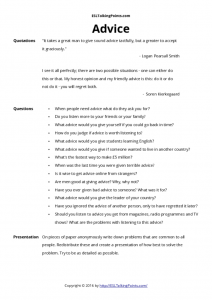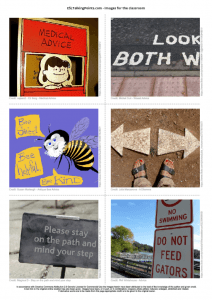Advice
There are times in our life when we cannot go it alone. We need the wisdom and perspective of another person or group to guide us to what we seek. Advice is plentiful these days, from online to our social group, however, is it always useful? How do you know if it should be followed? Can help from others be taken negatively?
This intermediate lesson aims to get students thinking about the context (medium, country, and person) of that advice.
- Language level: B1+
- Aim: The context of advice given
- Learner type: Young learners; Teens; Adults
- Time: 45 – 60 minutes
- Activities included: Discussing quotes, conversation questions, presentation, image discussion
- Topic: Advice and making suggestions
- Language: Any (could connect with teaching second conditional)
- Materials: Text and images
Useful vocabulary and phrases
- Actions speak louder than words (idiom) – Meaning, what someone does is often more important than what they are saying. Could be easily applied to politicians and celebrities.
- (to) Cut to the chase (idiom) – sometimes it is hard to be direct when talking about a sensitive subject. This phrase is asking the speaker to be more direct.
- The bigger they are the harder they fall (idiom) – It sometimes seems that more established and more reputable people are perfect, but more often than not, when they fail their mistakes are larger and more disastrous.
- Practice makes perfect (idiom) – We all make mistakes, but we should not try to focus on failure, but be strong enough to keep trying until we become better.
- Sage advice (phrase) – meaning help given by someone that is really useful and helpful to them in some way. Sage is also a noun from old English to describe a very wise person.
- “If I were in your shoes, I would… ” – A second conditional statement, but more natural sounding.
- “You have no choice but to…” – only one option I’m afraid.
- “Whatever you do, try not to…” – helpful suggestion.
- One thing you can/must/should/ought to/can’t/must not/shouldn’t/ought not to do is – Using modal verbs is important when brainstorming helpful ideas.
- “The best thing to do would be to ….” – Another starting phrase.
Advice printable worksheet
- Download the PDF talking points page: Conversation worksheet PDF
- Download the PDF images for class: Images PDF
Did you know?
- People who are looking for help in how to solve their debt problems or who are experiencing financial problems are often in full-time employment. A study from 2005 showed that in the US people wanting help from an expert, almost 57% were in full-time employment. Source
- When observing happy relationships, it was found that couples often say or do 5 positive things for every negative one. So the ratio of a happy relationship is 5:1.
- Happy couples often talk more. Roughly 5-6 hours per week.
Quotations
“It takes a great man to give sound advice tactfully, but a greater to accept it graciously.”
– Logan Pearsall Smith
“I see it all perfectly; there are two possible situations – one can either do this or that. My honest opinion and my friendly advice is this: do it or do not do it – you will regret both.”
– Soren Kierkegaard
Questions
• When people need advice what do they ask you for?
• Do you listen more to your friends or your family?
• What advice would you give yourself if you could go back in time?
• How do you judge if advice is worth listening to?
• What advice would you give students learning English?
• What advice would you give if someone wanted to live in another country?
• What’s the fastest way to make £5 million?
• When was the last time you were given terrible advice?
• Is it wise to get advice online from strangers?
• Are men good at giving advice? Why, why not?
• Have you ever given bad advice to someone? What was it for?
• What advice would you give the leader of your country?
• Have you ignored the advice of another person, only to have regretted it later?
• Should you listen to advice you get from magazines, radio programmes and TV shows? What are the problems with listening to this advice?
Presentation
On pieces of paper anonymously write down problems that are common to all people. Redistribute these and create a presentation of how best to solve the problem. Try to be as detailed as possible.








